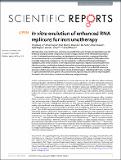In vitro evolution of enhanced RNA replicons for immunotherapy
Author(s)
Li, Yingzhong; Teague, Brian Paul; Su, Zhijun; Porter, Ely; Dobosh, Brian S; Wagner, Tyler E; Irvine, Darrell J; Weiss, Ron; ... Show more Show less
DownloadPublished version (1.670Mb)
Publisher with Creative Commons License
Publisher with Creative Commons License
Creative Commons Attribution
Terms of use
Metadata
Show full item recordAbstract
Self-replicating (replicon) RNA is a promising new platform for gene therapy, but applications are still limited by short persistence of expression in most cell types and low levels of transgene expression in vivo. To address these shortcomings, we developed an in vitro evolution strategy and identified six mutations in nonstructural proteins (nsPs) of Venezuelan equine encephalitis (VEE) replicon that promoted subgenome expression in cells. Two mutations in nsP2 and nsP3 enhanced transgene expression, while three mutations in nsP3 regulated this expression. Replicons containing the most effective mutation combinations showed enhanced duration and cargo gene expression in vivo. In comparison to wildtype replicon, mutants expressing IL-2 injected into murine B16F10 melanoma showed 5.5-fold increase in intratumoral IL-2 and 2.1-fold increase in infiltrating CD8 T cells, resulting in significantly slowed tumor growth. Thus, these mutant replicons may be useful for improving RNA therapeutics for vaccination, cancer immunotherapy, and gene therapy.
Date issued
2019-05-06Department
Massachusetts Institute of Technology. Department of Biological Engineering; Massachusetts Institute of Technology. Department of Materials Science and Engineering; Koch Institute for Integrative Cancer Research at MITJournal
Scientific reports
Publisher
Springer Science and Business Media LLC
Citation
Li, Yingzhong, et al. "In vitro evolution of enhanced RNA replicons for immunotherapy." Scientific reports 9 (2019): 6932 © 2019, The Author(s)
Version: Final published version
ISSN
2045-2322
Keywords
Multidisciplinary